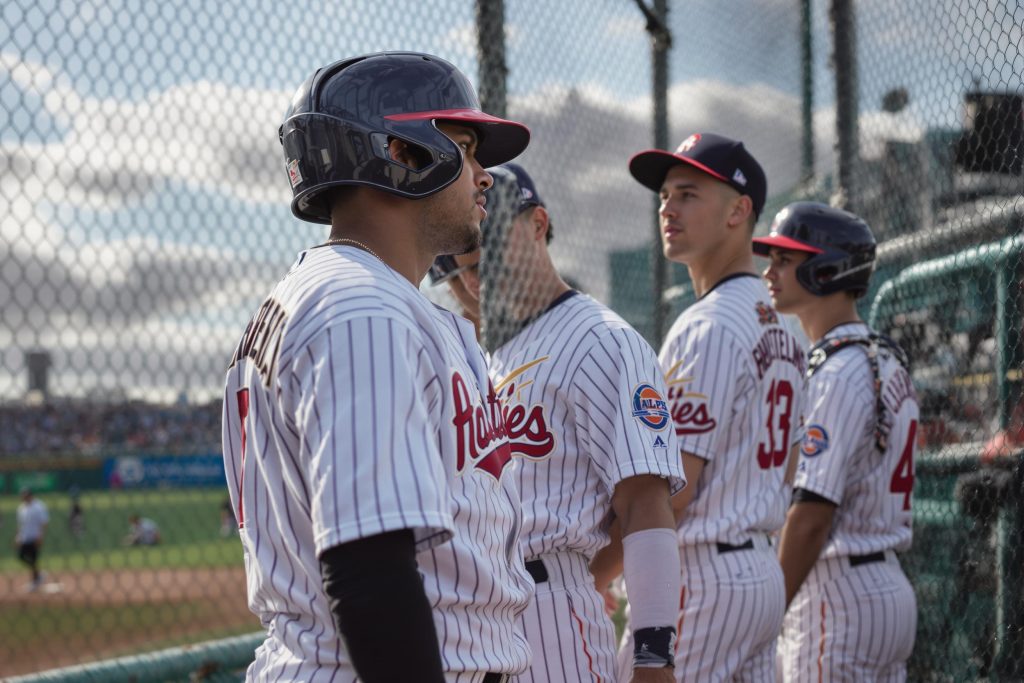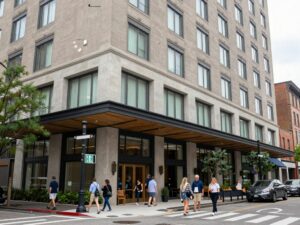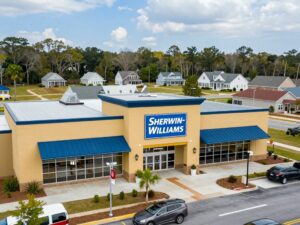In the heart of summer, when college baseball seasons wind down, the Coastal Plain League (CPL) and its Lexington County Blowfish bring communities together for a unique brand of baseball. This wood-bat collegiate summer league, steeped in tradition and local pride, offers top college players a chance to hone their skills while delivering affordable, family-friendly entertainment. From its origins in the 1990s to its role in shaping MLB prospects, the CPL embodies the spirit of America’s pastime. Let’s explore the history of the CPL, the rules that define it, its impact on players and communities, and how fans and social media have embraced it.
History of the Coastal Plain League and Collegiate Summer Baseball
The Coastal Plain League, founded in 1997 by Pete Bock, is a premier wood-bat collegiate summer baseball league spanning North Carolina, South Carolina, Virginia, and Georgia. Named after a Class D minor league from the 1930s and 1940s, the modern CPL began with six teams and has grown to 15 by 2025, with the Greenville Yard Gnomes as the latest addition. Bock, a sports executive, created the league to bring high-level summer baseball closer to home after traveling to see his son play in Virginia’s Valley Baseball League.
Collegiate summer baseball emerged in the late 19th century but gained prominence in the 20th century as a bridge between college and professional play. Leagues like the Cape Cod Baseball League, founded in 1885, set the template: college players competing under professional conditions during summer breaks. By the 1990s, Major League Baseball began sanctioning these leagues to standardize player development, ensuring college athletes could compete with wood bats and professional rules without falling behind peers in rookie leagues. Today, over 30 summer leagues operate across North America, with the CPL among the most competitive, boasting over 1,450 alumni drafted by MLB teams.
Rules, Wooden Bats, and Player Compensation
The CPL operates under NCAA eligibility rules to preserve players’ amateur status. Key regulations include:
- Wooden Bats: Unlike college baseball’s aluminum or composite bats, CPL players use wooden bats, mirroring professional leagues. This rule, standard across summer leagues, helps scouts evaluate prospects under MLB conditions and prepares players for the pros’ different swing mechanics.
- Eligibility: Players must have completed at least one year of college and have remaining athletic eligibility. They come from NCAA, NAIA, and junior college programs.
- Schedule: The CPL season runs from early June to early August, with 46-56 games, including daily games and overnight road trips, resembling a minor league schedule.
- Umpiring: The CPL partners with Minor League Baseball Umpire Development, using professional umpires, some of whom have advanced to MLB.
Players are unpaid to maintain NCAA eligibility, a hallmark of summer collegiate leagues. Instead, they receive housing (often with host families), meals, and travel accommodations. Teams operate like minor league franchises, with charter bus travel and professional-grade facilities, giving players a taste of pro baseball without compensation.
Impact on MLB Draft Prospects
The CPL is a proven pipeline to professional baseball. Since 1997, over 1,450 CPL alumni have been drafted, with 109 reaching the majors, including stars like Justin Verlander (2002 Edenton Steamers) and Russell Wilson (2010 Gastonia Grizzlies). The league’s wood-bat format and rigorous schedule allow scouts to assess players in conditions closer to the pros. For example, in 2024, 38 Appalachian League alumni (a similar summer league) were drafted, showing the impact of these leagues. Players like Lexington County Blowfish’s Trace Whetsell have noted that facing SEC-level competition in the CPL provides exposure to scouts, especially for those from smaller schools. The CPL’s partnership with MLB, including umpire development, enhances its credibility as a scouting ground.
Fan Experience and Community Impact
The CPL and Lexington County Blowfish are known for their vibrant fan bases and deep community ties. The Blowfish, who joined the CPL in 2006 after replacing the Capital City Bombers, play at Lexington County Baseball Stadium in South Carolina. Named after the band Hootie and the Blowfish, the team has won four CPL Organization of the Year awards (2006, 2015, 2022, 2023) and two Petitt Cups (2012, 2023). Fans enjoy all-you-can-eat ticket plans, theme nights, and fireworks, creating a festive atmosphere. Attendance often leads the league, with thousands filling the stands for home games.
Fans praise the CPL for its affordability and accessibility. A 2019 article noted that Blowfish games foster a “family-friendly” vibe, with locals like Gilbert native Trace Whetsell calling it a “dream come true” to play for his hometown team. Communities benefit economically and socially, as games draw visitors and unite residents. Host families, who house players, strengthen bonds, with players like Zacchaeus Rasberry praising their hospitality. The CPL’s expansion, including new stadiums in Florence and Lexington County, has revitalized local economies, with facilities like Gastonia’s $15 million ballpark showcasing the league’s investment in its markets.
Social Media Reactions
Social media platforms, especially X, buzz with enthusiasm for the CPL and Blowfish. Fans share photos of packed stadiums, with posts like, “Nothing beats a Blowfish game under the lights! #CPLBaseball.” The team’s 2023 Petitt Cup win sparked celebration, with X users posting, “Blowfish bring it home! Lexington proud!” The CPL’s official account regularly highlights player performances, like a 2025 post about a Longwood catcher’s .526 batting average, earning comments like, “Future MLB star right here!” On Instagram, fans post clips of fireworks and mascot antics, with hashtags like #BlowfishBaseball and #CoastalPlain trending. Critics occasionally note the intense schedule, with one Reddit user joking, “CPL players must be exhausted!” but overall, sentiment is positive, emphasizing community pride and player development.
Conclusion
The Coastal Plain League and Lexington County Blowfish represent the heart of collegiate summer baseball—a blend of tradition, competition, and community. With wooden bats, unpaid players, and a pro-style schedule, the CPL prepares athletes for the MLB draft while delivering unforgettable experiences for fans. From its 1997 founding to its 2025 season, the league has grown into a southeastern staple, fostering future stars and strengthening towns like Lexington. As summer nights light up with baseball, the CPL proves that, at the end of the day, it’s more than a game—it’s a way of life.
FAQ: Coastal Plain League and Lexington County Blowfish
What is the Coastal Plain League (CPL)?
The CPL is a wood-bat collegiate summer baseball league founded in 1997, featuring 15 teams across North Carolina, South Carolina, Virginia, and Georgia. It provides college players with professional-style competition.
Who are the Lexington County Blowfish?
The Blowfish are a CPL team based in Lexington County, South Carolina, since 2006. Known for family-friendly fun, they’ve won two Petitt Cups (2012, 2023) and four CPL Organization of the Year awards.
How did collegiate summer baseball start?
Collegiate summer baseball began in the late 19th century, with leagues like the Cape Cod Baseball League (1885). The CPL, started by Pete Bock in 1997, is part of a 1990s MLB-sanctioned effort to standardize player development.
What are the CPL’s key rules?
Players use wooden bats, must have college eligibility, and are unpaid to maintain NCAA status. The season runs June to August with 46-56 games, using professional umpires and minor league-style operations.
Do CPL players get paid?
No, players are unpaid to preserve NCAA eligibility. They receive housing (often with host families), meals, and travel accommodations.
Does playing in the CPL help with the MLB draft?
Yes, over 1,450 CPL alumni have been drafted, with 109 reaching the majors, including Justin Verlander. The wood-bat format and pro-style schedule attract MLB scouts.
What is the fan experience like in the CPL?
Fans enjoy affordable, family-friendly games with theme nights, fireworks, and all-you-can-eat tickets. The Blowfish lead in attendance, creating a festive atmosphere.
How does the CPL impact communities?
The CPL boosts local economies through tourism and new stadiums, like Lexington County’s. Host families and community events strengthen social ties.
How do fans react on social media?
X and Instagram posts celebrate Blowfish wins, player performances, and game-day vibes, with hashtags like #BlowfishBaseball. Fans praise the community spirit, though some note the grueling schedule.
A Deeper Dive: People and Organizations Mentioned
- Coastal Plain League (CPL): A wood-bat collegiate summer baseball league founded in 1997, with 15 teams in the Southeast. Known for MLB draft pipeline and community engagement. X: @CPLBaseball
- Lexington County Blowfish: CPL team since 2006, based in Lexington County, South Carolina. Won Petitt Cups in 2012 and 2023. X: @GoBlowfish
- Pete Bock: Founder of the CPL in 1997, a sports executive inspired to create a local summer league. X: Not publicly active.
- Justin Verlander: MLB pitcher, 2011 AL MVP, played for CPL’s Edenton Steamers in 2002. X: @JustinVerlander
- Russell Wilson: NFL quarterback, Super Bowl XLVIII winner, played for CPL’s Gastonia Grizzlies in 2010. X: @DangeRussWilson
- Trace Whetsell: Gilbert native, played for Blowfish in 2019 as a Limestone College senior. X: Not publicly active.
- Zacchaeus Rasberry: Blowfish outfielder in 2019, Presbyterian College senior from La Grange, North Carolina. X: Not publicly active.
- Major League Baseball (MLB): Professional baseball organization, sanctions CPL and supports umpire development. X: @MLB
- NCAA: Governing body of college sports, sets eligibility rules for CPL players. X: @NCAA
- Cape Cod Baseball League: Oldest collegiate summer league, founded in 1885, model for CPL. X: @officialccbl
Author: Todd Hunnicutt
Todd Hunnicutt is a dynamic media personality, entrepreneur, coach, and Chief Marketing Officer at Real Internet Sales. Renowned for his technology expertise, he's been featured in the New York Times, National Geographic, and major news outlets. As a nationally syndicated technology writer, Todd is a sought-after voice in marketing, ai, entrepreneurship, and economics, frequently interviewed by industry publications. A proud South Carolina native, he cherishes outdoor adventures, BBQ, Tuesday family dinners, and Sunday church services. A passionate baseball fan, Todd enjoys games alongside his wife, Elizabeth, whose umpire-call critiques rival instant replay. With an extensive background, he's collaborated with Fortune 500 companies, nonprofit startups, and political campaigns. A serial entrepreneur, Todd thrives on innovative ideas and loves hearing a compelling pitch!










